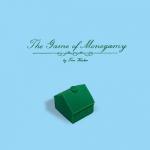
Tim Kasher The Game of Monogamy
(Saddle Creek)
Tim Kasher, the inimitable Cursive frontman and the brains behind The Good Life, is at it again. If you can make it past his sometimes off-pitch vocals and blinkered perspective of relationships, there’s something worth listening to here, even if just to catch the latest chapter in Kasher’s ongoing battle with himself.
If it’s not obvious by the album’s title, The Game of Monogamy is about, well, monogamy. Kasher — I’d wager rightly so — is not well known for subtlety. If you’re looking for drawn-out metaphor, turn away: Kasher is interminably forthcoming with his emotional state, and he doesn’t much mince words.
The Game of Monogamy is woefully inconsistent in quality: Tracks — from track to track as well as from minute to minute — range between the laudable and the regrettable, with but a few falling in the comfortable middle ground of mediocre. The very short Surprise, Surprise is awkward but somehow not tense, throwing a wrench into things, but simultaneously setting off the album’s best run of form. Things sort of run together from then, as the next few tracks meld together with some style — it doesn’t feel forced, and it seems to really work in context.
There Must Be Something I’ve Lost serves as a wonderful track to continue the album’s forward momentum: It achieves that awkward tension and keeps eyes solidly fixed on Kasher wringing out his problems before setting them out to dry in public view. It serves as a bit of a spectacle, this public outpouring of emotion, and the track sometimes strays from the musical point.
Tim Kasher’s solo turn — though he’s assisted in this by members of Minus the Bear and his own Cursive — proves evocative and engaging, even if Kasher’s experimentation with pop music sometimes goes awry. His swagger, though, saves the album from the depths it could have plunged.
This is considerably more poppy than what you’d expect from Cursive, and it’s clear: Kasher has never been content with playing it safe. The horns here can sometimes invite too much bravado, and the strings can seem unnecessarily dramatic, while the organ just seems out of place — but it’s with these eccentricities in mind that The Game of Monogamy takes flight.
18 November, 2010 - 16:43 — Matt Montgomery